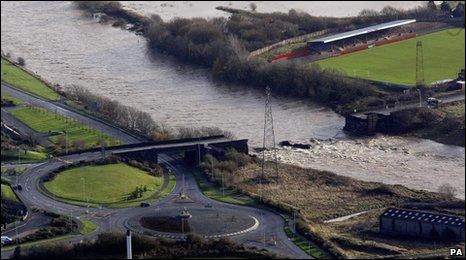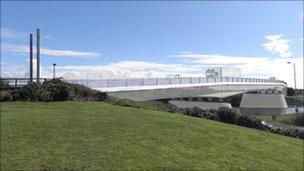Flood aid helps to rebuild Cumbria
- Published

Motorists from Workington faced a detour of about 18 miles to cross the Derwent
A year on from the floods which swept through Cumbria in November 2009, it is estimated the total cost of recovery has reached £276.5m.
The devastation saw bridges collapse, buildings destroyed and more than 1,300 homes flooded.
Most significant was the collapse of the Northside Bridge in Workington, which killed Pc Bill Barker, 44, and literally divided the town.
Cumbria County Council estimates £34m of damage was caused to transport and infrastructure alone.
It said businesses suffered the most - and has put a £129.2m price tag on the overall cost to the economy.
Despite this, Councillor Eddie Martin, leader of Cumbria County Council, said the county had "bounced back".
He said: "The Cumbrian spirit has triumphed and I believe that the county has successfully bounced back from its biggest natural disaster in recent memory.
"It has not been easy, it's taken a gargantuan effort to rebuild communities, restore services and repair most of the wreckage wrought."
The North West Development Agency (NWDA) played a large part in rebuilding communities, by providing funds to businesses through their Flood Recovery Grant Scheme.
The Environment Agency has also spent millions rebuilding defences and ensuring flood alleviation is in place. Much of its work is still going on.
One of the first projects to be completed was a £4.6m temporary bridge in Workington.

An artist's impression of what the new Northside bridge will look like on completion
The bridge was a necessity for residents, as without it traffic had to take an 18-mile detour.
Just days after the floods, the government announced it would give the county £1m to help it recover from the disaster.
This was shared between Allerdale Borough Council, South Lakeland District Council and Eden District Council, which received £738,136, £219,554 and £42,310 respectively.
Both Eden and South Lakeland gave their money to the Cumbria Community Foundation to allocate through the Cumbria Flood Recovery Fund which aimed to help individuals and businesses.
Exactly one year since the floods, the fund has raised a total of £2.5m - in addition to the money from the councils.
So far it is has spent £2.25m - with more earmarked for other projects.
David Andrews, grants officer for the Cumbria Community Foundation, said £600,000 had been given to more than 600 individuals and families who were flooded.
He said another £200,000 had gone to 500 people who lost jobs as a result of flooding or had "significant additional travel costs" while bridges were closed.
"We have so far spent £400,000 on grants for flood resilience and resistance to help people avoid being flooded again and some money has gone to joint schemes," Mr Andrews said.
Allerdale Council said it had allocated £697,000 of the £738,000 given to it by the government.
As of 31 October North West Development Agency [NWDA] grants worth £1.08m had been offered to 217 businesses in Cumbria.
The Flood Recovery Grant Scheme established by the NWDA within a few days of the floods was made available to small and medium businesses within six days.
So far claims totalling just under £670,000 have been paid out.
In addition to government money and donations, the Environment Agency has invested millions of pounds in flood resilience.
It said flood community groups had increased from 12 to 30 in a year and their flood line warning system had extended to an extra 3,000 homes and businesses.
Glyn Vaughan from the Environment Agency said it had spent more than £3m on works since the flood, across the county.
He said: "We have been working hard to make sure we reduce the flood works as much as we can."
- Published19 November 2010
- Published19 November 2010
- Published19 November 2010